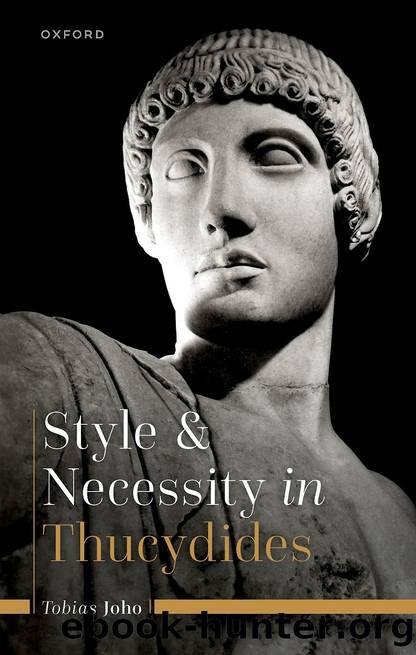Style and Necessity in Thucydides by Tobias Joho

Author:Tobias Joho [Joho, Tobias]
Language: eng
Format: epub
ISBN: 9780192540034
Publisher: OUP Oxford
Published: 2022-10-10T00:00:00+00:00
5.4 Victors and Losers After Pylos: An Unlikely Similarity
Thucydides provides insight into the moods that prevail among the Athenians and the Spartans after the Atheniansâ final success at Pylos and the capture of 120 Spartan and 172 Peloponnesian hoplites. These sentiments will shape their general mindset during the ensuing phase of the War. Although drastically contrary states of mind are dominant in each city, nevertheless both sides, victors and losers, turn out to be equally subject to natural inclinations that elude the moderating influence of rational control.
The Spartans have been reduced to a state of wholesale passivity with regard to the War and are in the grips of fear in the face of a potential revolution of the Helots: Thucydides describes them as âfearing that a revolution affecting the arrangements of their political system might happen to themâ (ÏοβοÏμενοι μὴ ÏÏίÏι νεÏÏεÏÏν Ïι γÎνηÏαι Ïῶν ÏεÏὶ Ïὴν καÏάÏÏαÏιν, 4.55.1). Thus, the Spartans have succumbed again to fear, the mental state that has been crucial in triggering the Peloponnesian War. The phrasing of the passage merits attention: first, Thucydides uses nominal periphrasis involving a verb in the perfect, thus expressing occurrence as opposed to agency (γÎνηÏαι); secondly, he fills the position of the subject with a phrase that interlocks two substantivized neuter expressions (νεÏÏεÏÏν Ïιâ¦Ïῶν ÏεÏὶ Ïὴν καÏάÏÏαÏιν); thirdly, he marginalizes human agency by using a dative to refer to the Spartans (ÏÏίÏι), thus suggesting their passive exposure to circumstances.
According to Thucydides, the reason for the state of shock that prevails among the Spartans is as follows: âthe calamity which had befallen them on the island had been great and unexpectedâ (γεγενημÎÎ½Î¿Ï Î¼á½²Î½ Ïοῦ á¼Î½ ÏῠνήÏῳ ÏÎ¬Î¸Î¿Ï Ï á¼Î½ÎµÎ»ÏίÏÏÎ¿Ï ÎºÎ±á½¶ Î¼ÎµÎ³Î¬Î»Î¿Ï , 4.55.1). Thucydides combines the term ÏÎ¬Î¸Î¿Ï with a perfect participle of γίγνομαι, a combination that expresses maximum passivity. The situation confronting the Spartans is marked by greatness and unexpectedness, the typical characteristics of a μεÏαβολή. Thucydides systematically avoids phrasing that might suggest human agency. After mentioning the capture of Pylos and Cythera (Î ÏÎ»Î¿Ï Î´á½² á¼ÏομÎÎ½Î·Ï ÎºÎ±á½¶ ÎÏ Î¸Î®ÏÏν, 4.55.1), Thucydides uses another genitive absolute: καὶ ÏανÏαÏÏθεν ÏÏá¾¶Ï ÏεÏιεÏÏῶÏÎ¿Ï ÏολÎÎ¼Î¿Ï ÏαÏÎÎ¿Ï ÎºÎ±á½¶ á¼ÏÏοÏÏ Î»Î¬ÎºÏÎ¿Ï (âand War, swift and uncontainable by precaution, encircled them from all sidesâ, 4.55.1). Thucydides represents the War as the Spartansâ arch nemesis: it âencircles themâ, in the guise of an enemy laying siege to his adversary. Used this way, the verb ÏεÏιίÏÏαμαι usually requires a personal subject.35 Instead of merely being confronted with a human opponent, however, the Spartans must deal with an impersonal super-agent, the Peloponnesian War itself.
Thucydidesâ observations at 4.55 about the general mood prevailing at Sparta in the wake of Pylos feature further phrases that convey the Spartansâ passivity (4.55.3):
καὶ ἠμα Ïá½° Ïá¿Ï ÏÏÏÎ·Ï Ïολλὰ καὶ á¼Î½ á½Î»Î¯Î³á¿³ Î¾Ï Î¼Î²Î¬Î½Ïα ÏαÏá½° λÏγον αá½Ïοá¿Ï á¼ÎºÏληξιν μεγίÏÏην ÏαÏεá¿Ïεâ¦
And at the same time the strokes of fortune caused very great consternation, since they had happened to them contrary to expectation in such great numbers and in so short a timeâ¦
Just as in the previous passage, Thucydides does not direct attention to people acting, but emphasizes events happening (Î¾Ï Î¼Î²á½±Î½Ïα).
Download
This site does not store any files on its server. We only index and link to content provided by other sites. Please contact the content providers to delete copyright contents if any and email us, we'll remove relevant links or contents immediately.
The Power of Myth by Joseph Campbell & Bill Moyers(1068)
Half Moon Bay by Jonathan Kellerman & Jesse Kellerman(987)
A Social History of the Media by Peter Burke & Peter Burke(987)
Inseparable by Emma Donoghue(983)
The Nets of Modernism: Henry James, Virginia Woolf, James Joyce, and Sigmund Freud by Maud Ellmann(913)
The Spike by Mark Humphries;(812)
The Complete Correspondence 1928-1940 by Theodor W. Adorno & Walter Benjamin(789)
A Theory of Narrative Drawing by Simon Grennan(783)
Culture by Terry Eagleton(776)
Ideology by Eagleton Terry;(743)
World Philology by(719)
Farnsworth's Classical English Rhetoric by Ward Farnsworth(715)
Game of Thrones and Philosophy by William Irwin(712)
Bodies from the Library 3 by Tony Medawar(709)
High Albania by M. Edith Durham(705)
Adam Smith by Jonathan Conlin(695)
A Reader’s Companion to J. D. Salinger’s The Catcher in the Rye by Peter Beidler(688)
Monkey King by Wu Cheng'en(654)
Comic Genius: Portraits of Funny People by(652)
